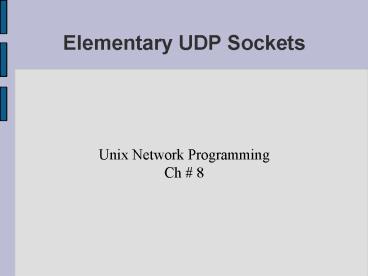Elementary UDP Sockets - PowerPoint PPT Presentation
1 / 10
Title:
Elementary UDP Sockets
Description:
we can set flags to 0 for simple udp sockets we will see ... Can make a big difference, for example if the application is a banking request ... – PowerPoint PPT presentation
Number of Views:579
Avg rating:3.0/5.0
Title: Elementary UDP Sockets
1
Elementary UDP Sockets
- Unix Network Programming
- Ch 8
2
UDP Sockets
- There are fundamental differences between apps
written using TCP vs. those that use UDP sockets - because of differences in the two transport
layers - UDP is connectionless, unreliable, datagram
- quite unlike TCP connection-oriented, reliable,
streams
3
Typical UDP client/server
- fig 8.1, pg 240
- Client does not establish a connection to the
server - client just sends a datagram to the server using
sendto() function - similarly, server does not accept a connection
from client, instead simply calls recvfrom()
function which waits for data to arrive
4
Typical UDP Client/Server
5
recvfrom and sendto functions
- Similar to standard read/write functions, but
with 3 additional arguments
include ltsys/socket.hgt ssize_t recvfrom(int
sockfd, void buff, size_t nbytes, int flags,
struct sockaddr from, socklen_t
addrlen) ssize_t sendto(int sockfd, const void
buff, size_t nbytes, int flags,
const struct sockaddr to, socklen_t
addrlen) Both return number of bytes read or
written if OK, -1 on error
- we can set flags to 0 for simple udp sockets we
will see - besides flag, need a sockaddr and length of the
structure, of where to send or where data
received from
6
UDP Client/Server
- Echo Server UDP version
7
UDP Servers
- server (dg_echo) never terminates
- UDP is connectionless, there is nothing like EOF
as we have with TCP - It is an iterative server, not a concurrent
server - No call to fork
- single server process handles any and all clients
- generally TCP servers are concurrent and UDP are
iterative - implied queuing in UDP layer handles cases of
multiple clients.
8
UDP Servers
9
Echo Client UDP version
10
Lost Datagrams
- UDP client/server example is not reliable
- If client datagram is lost, client will block
forever waiting for server reply - Same thing if the server datagram reply is lost,
client is again blocked. - Typical way to prevent is place a timeout on
clients recvfrom. - But can't tell which situation occurred, was the
clients request lost, or was it processed and
simply the server's reply lost - Can make a big difference, for example if the
application is a banking request to make a
deposit rather than a simple echo server.

